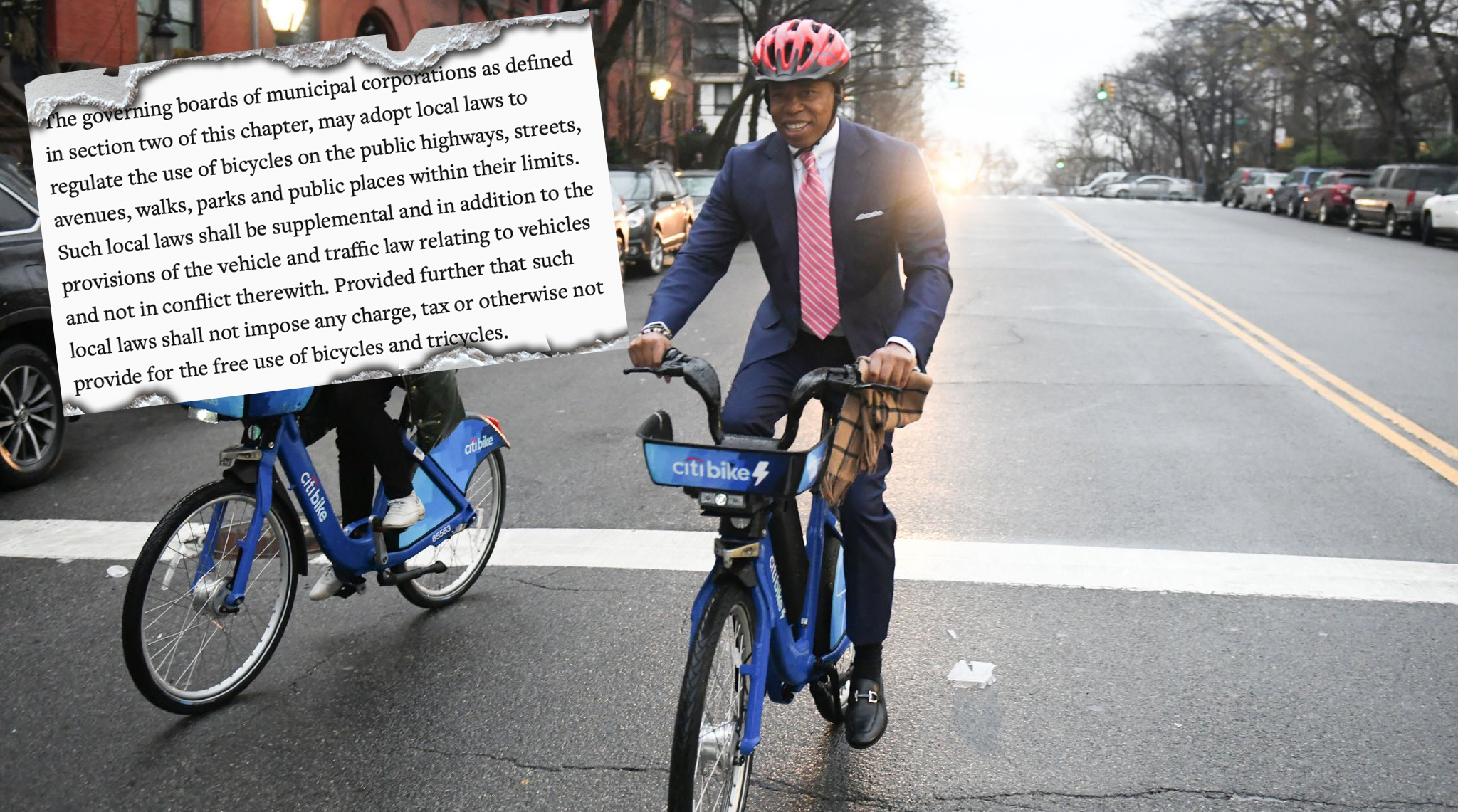Make America plate again?
A pending City Council bill would require the DOT to register electric bikes — but such a new enforcement regime does not appear to be legal under state law, even setting aside the concern by advocates that the proposal would not even make roadways safer and would give cops another way to harass immigrants.
Buckle up, dear reader, because we're diving into the municipal code:
First, let's pull up section 180 of state municipal law. It's just one paragraph:
The governing boards of municipal corporations as defined in section two of this chapter [that includes New York City, by the way], may adopt local laws to regulate the use of bicycles on the public highways, streets, avenues, walks, parks and public places within their limits. Such local laws shall be supplemental and in addition to the provisions of the vehicle and traffic law relating to vehicles and not in conflict therewith. Provided further that such local laws shall not impose any charge, tax or otherwise not provide for the free use of bicycles and tricycles.
That's pretty straightforward: It says that cities can regulate the use of bikes. But they can't do so in a way that conflicts with state law — and they certainly can't do so if doing so requires a fee that would violate the "free use" clause.
In fact, Intro 606, written by Council Member Bob Holden, does outline a fee, which would be set by the Department of Transportation.
"So for Intro 606 to take effect, the city would have to go Albany to get permission to pre-empt the 'free use' part of the statute," said lawyer Daniel Flanzig, who typically works with crash victims. "It says clearly that 'such local laws shall not [be] in conflict therewith' the state laws."
"Basically," Flanzig added, "these Council members write laws based on what their constituents are complaining about but never bother to check if it legal or practicable."
State law classifies all e-bikes — whether basic pedal-assist (Class 1), slower throttle-controlled e-bikes (Class 2) and 20- to 25-mile-per-hour e-bikes (Class 3) — as "bicycles" that are not subject to registration by the state Department of Motor Vehicles because state law does not classify them as motor vehicles like mopeds, motorcycles and cars.
Intro 606 gets around that by simply stating that those three state classes, plus stand-up electric scooters, "shall be registered with the [DOT] commissioner and provided a distinctive identification number and a license plate corresponding to that distinctive identification number. ... The fee for such plate shall be determined by the commissioner."
Another bike lawyer, Peter Beadle, concurred that Intro 606 is illegal because the mention of a fee violates the "free use" clause, but also because it goes beyond what the state meant when it said cities could "regulate the use of bicycles."
"The registration in Intro 606 is something beyond what's contemplated by Section 180," he told Streetsblog. "Of course, a city can say that bikes shouldn't be on sidewalks, that they should go in the same direction as a one-way street, that they need a bell and lights. Those are all reasonable in order to 'regulate' the use of a bicycle. But when you get to registration with a fee, you are now creating a barrier to use, which is not allowed."
E-bike registration also discourages the use of e-bikes, which are a big part of the city's stated goals to encourage modes of transportation aside from cars.
The bill would create problems for DOT, which would be required to create an entirely new registration system for these bikes. That is not something the agency currently does for any other vehicle types, though Citi Bikes and electric scooters are registered and tracked by the private companies that operate those systems.
That's another way in which Intro 606 is legally flawed, said lawyer Brandon Chamberlin:
"The bill says that 'no bicycle with electric assist, electric scooter or other legal motorized vehicle shall display any plate other than that issued by the commissioner,' but all that means is that if New York City adopts this, and then other cities adopt this, you'd have a situation where someone biking from Yonkers has to swap out his Yonkers plate at the city border. This is unworkable; drivers would never be asked to change their equipment at the border.
"This would lead to town-by-town regulation of bicycles," Chamberlin added.
Holden defended his legislation, which he named after Priscilla Loke, who was killed by an electric Citi Bike rider.
"Priscilla's Law is about accountability and safety—nothing more, nothing less. Opponents have resorted to fearmongering, claiming it will lead to unwarranted police stops, as if breaking traffic laws and endangering lives should ever be excused," he told Streetsblog. "This bill honors the memory of Priscilla Loke and protects all New Yorkers by ensuring that those who share the road also share the responsibility for keeping it safe."
A spokesman for Holden said that the bill had the input of the Council's attorneys, but a spokesman for the city Law Department declined to comment on that.
The spokesman said the city is legally permitted to require a city-issued license plate, though legal minds disagree.
You can submit testimony to the City Council directly by emailing it to testimony@council.nyc.gov. The deadline is 72 hours after the close of the hearing, which begins on Wednesday at 10 a.m.






